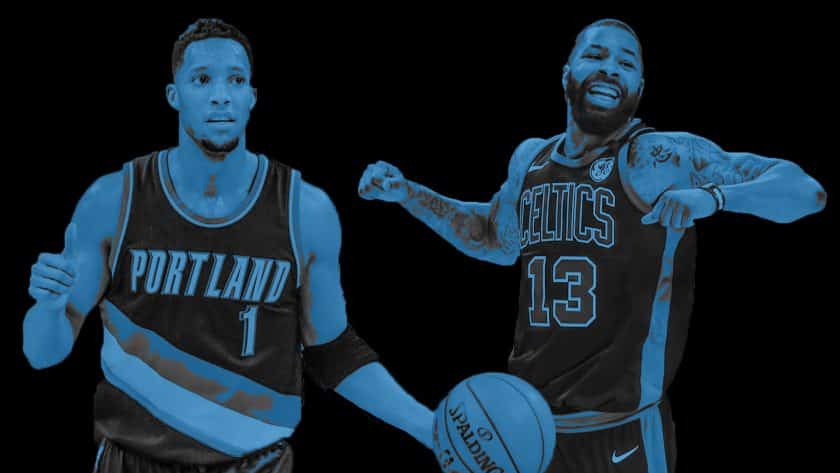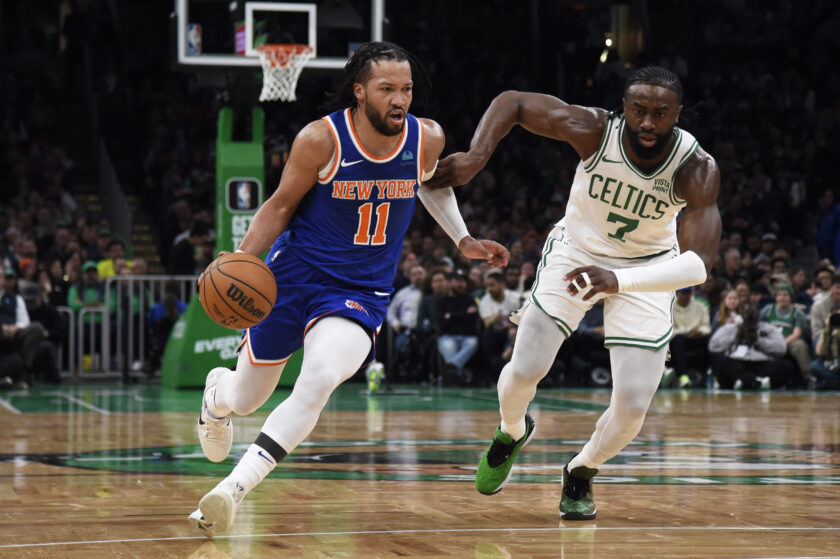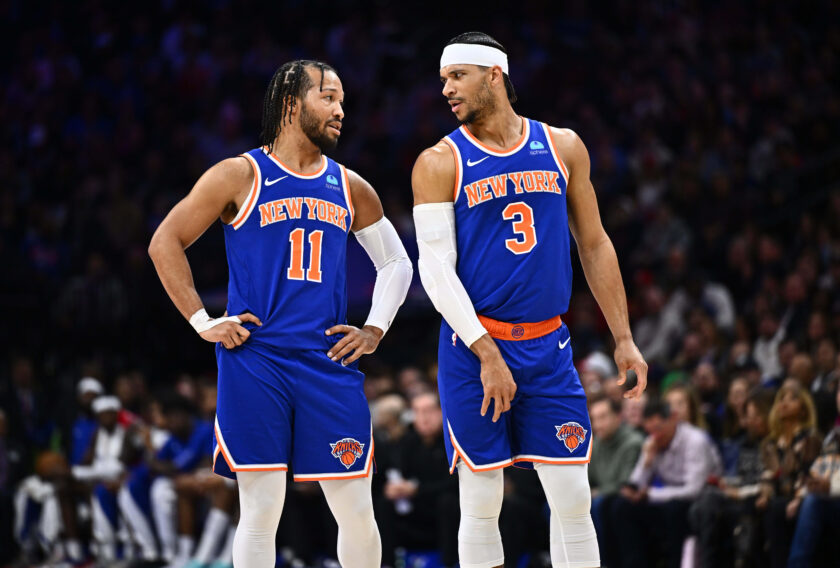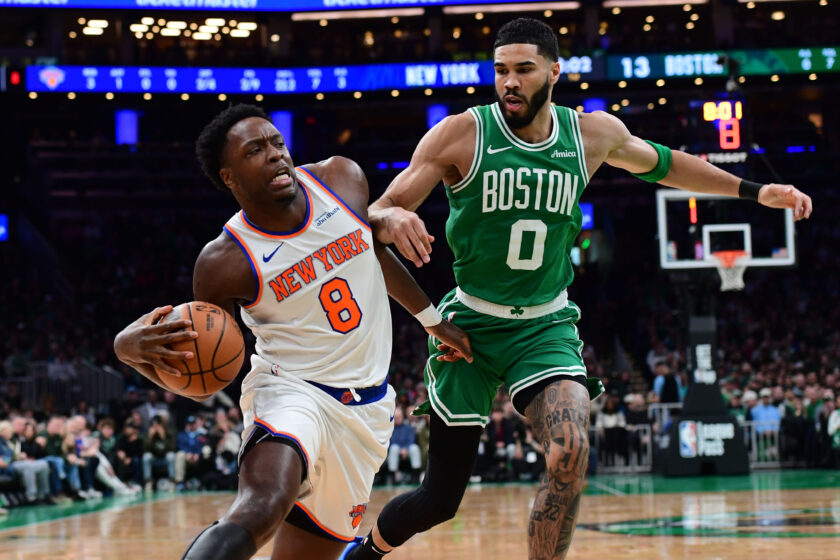New York Knicks offseason: Absorbing bad contracts vs. one-year deals

Should the New York Knicks strike out in free agency, they have to decide between taking on bad contracts and short deals with a team option.
[sc name=”Geoffrey Campbell Banner”]The New York Knicks front office group text must’ve been wild during Game 5 of the NBA finals. Top free-agent target Kevin Durant went down with what we now know as a ruptured Achilles, and subsequently, the Knicks offseason plans were shoved into a blender.
Well … not really, but it certainly felt like it.
Despite the doomsday scenarios in which the Knicks don’t attract top-tier free agents, there is absolutely a pathway to success. Part of that pathway may involve signing free-agents to cap-friendly one-year deals to preserve future cap space. It may also involve taking on one of the NBA’s bad contracts attached with draft picks to help add prospects to an impressive young and developing core.
Most recently, the Atlanta Hawks employed this strategy by taking on Allen Crabbe‘s contract in a trade with the Brooklyn Nets. For the Nets, the move created the potential cap space needed to sign a max free-agent this offseason. And for the Hawks, the move garnered them another first-round draft in the 2019 draft and subsequently another first-round pick (lottery protected) in the 2020 draft.
Last season, the Chicago Bulls signed Jabari Parker to a one-year deal with a team option. Parker, who struggled to find teams wanting to offer him a multi-year deal, received $20 million per year, which was more than he was going to receive on the open market. The Knicks even signed players like Mario Hezonja and Noah Vonleh to one-year deals to preserve cap space for the free agent class 2019. This model can and should definitely be considered going forward.
The Knicks (without hitting the lottery in free agency) don’t project to be good for at least a few seasons. They needed to decide between adding assets via taking on money or signing free-agent to one-year deals with a team option in order to preserve cap space. The latter approach can keep the Knicks in the conversation for Anthony Davis, who, despite just being traded to the Los Angeles Lakers, will be entering free agency in 2020.
Let’s take a look at some of the players the Knicks could target via trade or one-year deals this summer.
[sc name=”Knicks Title” text=”Bad contracts” ]Nicolas Batum F Charlotte Hornets
Still relatively young, Batum, at 6-foot-8, represents a skilled and long forward who can shoot, pass and defend. Durability is not a question with the Frenchman. Per Basketball-Reference, Batum has played in at least 60 games per season since 2012-2013. He shot a career-high 38 percent from three and 45 percent from the field. Per Spotrac, Batum is owed $25 million for the 2019-2020 season and $27 million during the 2020-2021 season.
Batum clearly still has something left to offer a team. Especially if the Charlotte Hornets sign Kemba Walker to a supermax five-year deal, they could be looking to unload Batum’s contract in an effort pair someone with Walker. However, trading for Batum probably takes you out of the running for Anthony Davis in 2020.
If Walker signs somewhere else, getting rid of Batum’s contract becomes even more imperative as they probably enter another full rebuild. The Knicks would have to get a first round pick or maybe a look at Malik Monk for absorbing Batum’s money for the next two seasons.
[sc name=”Knicks Center” ]Dennis Schroder G Oklahoma City Thunder
Schroder played a key role as a secondary playmaker on an OKC team that underperformed taking a shocking loss to the Portland Trailblazers in the first round of the playoffs. Schroder averaged 15.5 points per game and shot a career-high 34 percent from three. Schroder’s greatest skill is getting to the rim. He might not be blessed with Russell Westbrook speed, but he possesses a crafty handle and ability to get to the rim despite the defense in front of him.
Schroder’s contract is not “bad” by any means. Still a productive young player (26 years old), Schroder will make $15 million next season and $17 million during the 2020-21 season. Trading Shroder may be in the best interest for OKC. After losing to the TrailBlazers OKC will have to take a deep look at themselves and evaluate all possibilities around maximizing talent around Westbrook and Paul George.
Oklahoma City has increased its efforts this afternoon to shed salary along with the No. 21 pick en route to dodging luxury tax, league sources say. Steven Adams, Andre Roberson, Dennis Schroeder all very available at the moment.
— Jake Fischer (@JakeLFischer) June 19, 2019
The urgency to compete in a year where Kevin Durant and Klay Thompson will both miss significant time for the Golden State Warriors may push OKC to offer the Knicks a first-round pick to take Schroder’s contract off their hands. Schroder immediately becomes one of the better if not the best point guard the Knicks have had in the last 10 years. Yet, the Knicks may feel that a player like Schroder, who essentially runs the offense off drive and kick when he plays, might also take away valuable minutes from the newest Knick RJ Barrett.
Evan Turner G Portland Trailblazers
Turner is coming off his third season in Portland where he averaged 6.8 points per game on 46 percent shooting. He’s always been thought of as a secondary play-maker who mainly operates in the mid-range. But with his scant production, the Trailblazers would love to get rid of his $18.6 million next season to pursue another impact player to pair with both Damian Lillard and CJ McCollum.
Turner is the third highest paid player on the Trailblazers, a team which is currently over the cap for the 2019-2020 season. While a returning Jusuf Nurkic may make management comfortable standing pat with a squad that just made the conference finals, injuries to two of Golden State’s top guns have got to make all Western Conference contenders aggressive. Furthermore, the Knicks could hopefully secure a first-round pick or a young player like Anfernee Simmons in a trade for Turner.
[sc name=”Knicks Title” text=”One-year deals with a team option” ]
Marcus Morris F Boston Celtics
According to NBC Sports A. Sherrod Blakely, The Knicks have interest in free-agent Marcus Morris. This past season, Morris, in 79 games for the Celtics, averaged 13.9 points per game on 44 percent shooting from the field. Morris, along with teammate Kyrie Irving, was never too shy about voicing his displeasure in regards to the team’s inconsistent play and lack of cohesion on the floor.
Morris is a talented player who fits coach David Fizdale’s philosophy of positionless basketball as a forward who can switch and guard multiple positions. However, the Knicks, who have numerous young players on the roster, need to be careful with the type of veteran leadership they put around players like Kevin Knox, Mitchell Robinson, Allonzo Trier and Barrett.
At 29 years old, Morris, who made a very team friendly $5.3 million last season, will most likely look for a long-term deal worth at least double or triple that annual salary. However, it’s also quite possible that teams around the NBA may subscribe to what Knicks fans are hoping their teams does, should they strike out on players like Durant, Kawhi Leonard and Kyrie Irving: Don’t overspend on second or third tier free-agents!
This may open the door for the Knicks to offer Morris a larger one year deal worth $20 million (ala Jabari Parker deal), with a team option, which maintains cap flexibility for the free agent class of 2020.

Cory Joseph G Indiana Pacers
Back in 2015-2016, the Toronto Raptors signed Joseph to a four-year $29 million deal. Joseph will be an unrestricted free agent this summer and is just coming off a season, with the Pacers, where he played in all 82 games and averaged over 25 minutes per game. Joseph, for his efforts, averaged just over six points per game on 41 percent shooting from the floor.
However, it’s on the defensive end of the floor where Joseph makes his mark. According to NBAstats.com, out of all the Pacers who played at least 70 games, Joseph had the highest defensive rating (102.0). Furthermore, within that same group of players, Joseph’s on-court/off-court stats, regarding defensive rating, yield the biggest difference, even when compared with Myles Turner. Bottom line is that Joseph definitely brought it on the defensive end of the floor.
Joseph could serve as a very reliable back-up point guard to Dennis Smith Jr. He’s played 82 games twice in his eight-year career and he had back-to-back seasons where he shot 35 percent from the three-point line, in both the 2016-2017 and 2017-2018. Joseph, if he’s looking for a long-term deal may be another casualty of a very deep free-agent class. If that’s the case, the Knicks should be ready to swoop in and offer a more lucrative one year deal with a team option.

Nik Stauskas G Cleveland Cavaliers
The Knicks desperately need shooting. The orange and blue were ranked within the bottom 10 teams in three-pointers made, attempted and three-point percentage. Stauskas, despite already being on five teams in only his fifth season in the league, can definitely shoot the ball. He’s a career 35 percent shooter from the three-point line and a former lottery pick from the 2014 draft.
Signing Stauskas actually mirrors the Knicks free agent philosophy last offseason, when they signed former lottery picks to short deals like Hezonja and Vonleh. Stauskas is just 25-years old and he plays close to 15 minutes a night. Last year Stauskas made barely over $500 thousand, thus it presents the Knicks with low-risk opportunity to get an above average shooter, on the cheap, without sacrificing major cap space.
[sc name=”Knicks Title” text=”Conclusion” ]In the end, my preference would be for the Knicks to opt for one-year deals with team options and let the young core of Knox, Robinson, Trier, and Barrett run wild. If you opt for absorbing bad contracts with draft picks attached, then you need to feel confident about getting someone from either the 2020 or 2021 free agent class. Currently, the 2021 class includes players like Paul George (player-option), CJ McCollum, Bradley Beal and Victor Oladipo.
Preserving cap space allows you to be in play for free-agency as a means towards improving the team. However, it also allows the Knicks to sign their own players if they can earn extensions on their rookie deals. I’d like to think that at least one or maybe two out of our four most prized assets will be Knicks for the foreseeable future. We will the money to sign them.
Thus far we’ve heard the right things from Steve Mills and Scott Perry. They’re committed to building the team through the draft and don’t want to waste valuable cap space on the “wrong” free-agents. Yet outside of that philosophy, both executives need to balance the idea of putting a winning product on the floor with developing their young players. This tight-rope walk will be one of the more fascinating stories to watch for during the summer and in the future.
Their execution, or lack thereof, will probably determine whether they end up as heroes in the big apple or just another failed recycled regime in Madison Square Garden.
[sc name=”Twitter Follow Link” username=”@geoff_boy_ardee” ] [sc name=”Knicks Link Next” link=”https://elitesportsny.com/2019/06/21/rj-barrett-is-the-star-the-new-york-knicks-need-to-establish-an-identity/” text=”RJ Barrett Is The Star The Knicks Need To Establish An Identity ” ]




